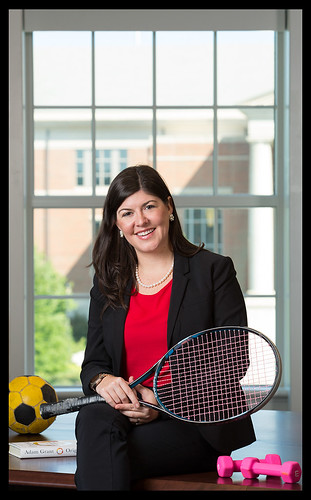
A quick glance at the newest words added to The Oxford Dictionary reminds us of the evolving ways people can spend their free-time: glamping, upcycling, binge watching, blogging, podcasting – the list goes on.
Kate Zipay, a doctoral student in the Department of Management in the Terry College of Business, explains how this prioritization of leisure may have important, yet undiscovered, ramifications for how individuals orient themselves to their work.
“My research explores the synergies between work and leisure,” Zipay explains. “In other words, when your work is done, your kids are fed, and your dishes are clean, what do you do with your time and how does it impact your work?”
Zipay is specifically interested in how the activities employees participate in outside of work change how they think and feel while they are at work.
“Surprisingly, we know very little about how our un-obligated time impacts our workplace attitudes and behaviors,” she says.
It was the realization that her leisure time was impacting her own day-to-day workplace experience that further motivated her research.
“In my own life, I’m always intrigued by the evolution of ‘who I am’ in all domains of my life. I recognize times when my yoga practice changes what type of coworker I am, or when a book changes the type of instructor I am. As these links become more evident in my own life, they have also become central to my research interests.”
Currently, Zipay is studying how employees incorporate aspects of their work into their leisure time (a process Zipay calls leisure hacking) in order to overcome time limitations and garner unique benefits at work.
According to Zipay, leisure hacking might come in the form of reading the latest New York Times bestseller about motivation, attending networking events, or even playing brain games.
“Personally, my favorite way to leisure hack is to enjoy my morning coffee while watching a TEDtalk.”
Her research is focused especially on how leisure hacking impacts workplace thriving – the state of both vitality and learning at work.
For her study, coauthored with Terry College of Business professors Jessica Rodell and Jason Colquitt, Zipay asked working adults in positions such as client relations, accounting, technology support, and management to complete short surveys over a 6-week period.
Using this approach, they were able to explore how leisure hacking throughout the week and over the weekend impacted thriving through both positive (such as self-esteem) and negative (such as work compulsivity) mechanisms. In addition, they examined thriving related to both work (i.e. performance) and non-work (i.e. life satisfaction) outcomes.
While still analyzing the data she collected, Zipay shares that her preliminary results show employees’ leisure activities can have a real and relevant impact on their workday.
“My study reveals that the activities you choose to take up in your free-time can enhance your energy and growth in the workday,” she says. “Participants that engaged in leisure hacking also reported higher levels of life satisfaction at the end of the day. Moreover, the experience of thriving increased work performance – so much so that it was recognizable by coworkers.”
Zipay stresses though that it is not just about whether you take time to pursue leisure activities, but which leisure activities you pursue.
“Taking it to the real-world, when employees choose to ‘leisure hack’ and listen to the latest Freakanomics podcast rather than binge watch a juicy reality show, this choice will impact how they act and feel at work the next day.”
“Through understanding better the links between work and leisure, I hope my research will help both employees and organizations support the benefits of leisure in ways that lead not only to better performance, but to fuller, more fruitful lives in and outside the workplace,” she says.
After graduation, Zipay plans to pursue a tenure-track faculty position and continue to pursue the phenomenon of leisure hacking and the work–leisure interface.
“If my research leads more organizations to recognize that sometimes becoming a great employee happens outside the office, then I’ll know I’m making a meaningful contribution both to managers and management scholars.”
